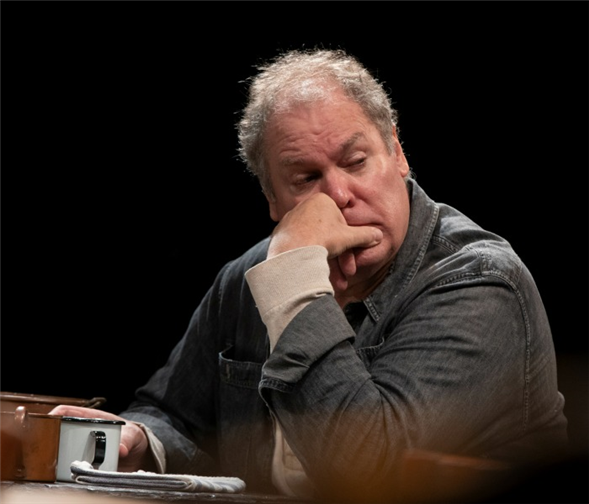Translate Page

Jay O. Sanders stars in a stripped-down mounting of the Chekhov classic at a brand-new theatre company
---
Don't be surprised if you find yourself leaning in as you watch playwright-director Richard Nelson's achingly intimate take on Uncle Vanya, the inaugural production at the Hunter Theater Project. Staged in the round in a black box theatre with unpretentious performances and just a few kitchen tables for scenery, Chekhov's masterwork has been streamlined to one act and reduced to its essence: an extended family of malcontents wondering where they fit in and whether they matter.
If this reminds you of Nelson's Rhinebeck saga -- "The Gabriels" and "The Apple Family" cycles, which explored the everyday lives of two 21st-century clans living in upstate New York -- that's by design. Critics frequently compared those works to Chekhov, and "The Apple Family" plays were even subtitled "Scenes from Life in the Country," an allusion to Uncle Vanya's subtitle "Scenes from Country Life in Four Acts."
Veteran character actor Jay O. Sanders, who portrays the lovesick Vanya, appeared in all seven of Nelson's Rhinebeck plays, and he believes this production is an unofficial continuation of that project. "It's sort of a crowning of everything that Richard's been doing these past eight years," says Sanders. "He's going back to the source, to the well where all of those plays sprang from. The old joke is that every actor wants to do Chekhov, but none of them wants to go see it! I think this Vanya avoids being about a bunch of people playing tone and being all, 'I'm bored.' If all you're doing is exploring boredom, the audience is going to be bored watching it. What Richard understands is the characters are working not to be bored. They're fighting against being dragged down, they're fighting for hope and purpose. That's what all these plays are about. Why am I getting up today? Do I care about my life? I'm in such a depression -- how am I going to get out of this? It's amazing how many different ways you can tell this story and the audience goes, 'That's me.' It's the eternal, universal us."
{Image1}
Nelson's Vanya, which he co-translated with the husband-and-wife team of Richard Pevear and Larissa Volokhonsky, was commissioned by The Old Globe and premiered at that San Diego theatre earlier this year. Hunter College theatre department chair Gregory Mosher -- who produced numerous plays by Nelson during his tenure as the director of Lincoln Center Theater -- decided it would make the ideal first show for his new venture: the Hunter Theater Project.
Just as this Vanya is a bit of an artistic experiment, so is HTP. When asked what the company's first season looks like, Mosher laughs. "We don't have seasons -- we just do plays!" he says. "I got rid of everything. We don't have subscribers, we don't have members. So we'll see if it works. It's scary."
The idea for HTP actually came out of a graduate course Mosher taught at his previous post at Columbia University, as he and his young students discussed ways to develop a new model of affordable, engaging theatre in NYC, something different from commercial productions and nonprofit theatre subscriptions. He even crowd-sourced the shockingly reasonable ticket price of $37 by asking his Facebook friends: "What would you pay to see a good play?" Students spend even less: just $15.
Those enrolled in Hunter's theatre department enjoy an additional bigger benefit: the chance to attend rehearsals to watch the pros work things out. "That's like a semester's worth of scene study class right there," says Mosher. "They're grappling with exactly the same problems as the students. Why isn't this moment quite true? What are we doing here? One teacher brought a class of about 30 people and they watched for 90 minutes while Richard worked on 15 seconds of stage time and they were transfixed. Richard and the cast weren't trying to fix a problem -- they were trying to explore human behavior."
That's the heart of this Vanya, which sometimes seems so real you may feel like you're eavesdropping. Characters sit and schmooze and sip soup, and while nothing much happens in terms of events, there's lots of emotional action: heartbreak, betrayal, rage, lust, despair, hope.
"It's really hard to think of a new way to direct Vanya," says Mosher. "Often people add stuff -- turntables or electric lights or something. Every now and then people come along and say, 'We're going to strip it back.' I always think of state-of-the-art theatre as a space that has actors and audiences. That is the state of the art, as simple and as unadorned a space as possible. We've returned it to people and not special effects, scenery and, god forbid, 'concept.'"
Sanders agrees. "We're reinventing a classic but we're doing it by exploring it, not by putting some clever idea over it," he says. "So much of the emotion that goes on between people is not big. We see it subtly in the way that we do it. I think that Chekhov would be very taken with this production. It is completely true to the spirit of what he's written and what he wrote in his letters about what he imagined this to be."
To read about a student's experience at Uncle Vanya, check out this post on TDF's sister site SEEN.
---
Raven Snook is the Editor of TDF Stages. Follow her at @RavenSnook. Follow TDF at @TDFNYC.
Top image: Jay O. Sanders in Uncle Vanya. Photos by Joan Marcus.
TDF MEMBERS: Go here to browse our latest discounts for dance, theatre and concerts.